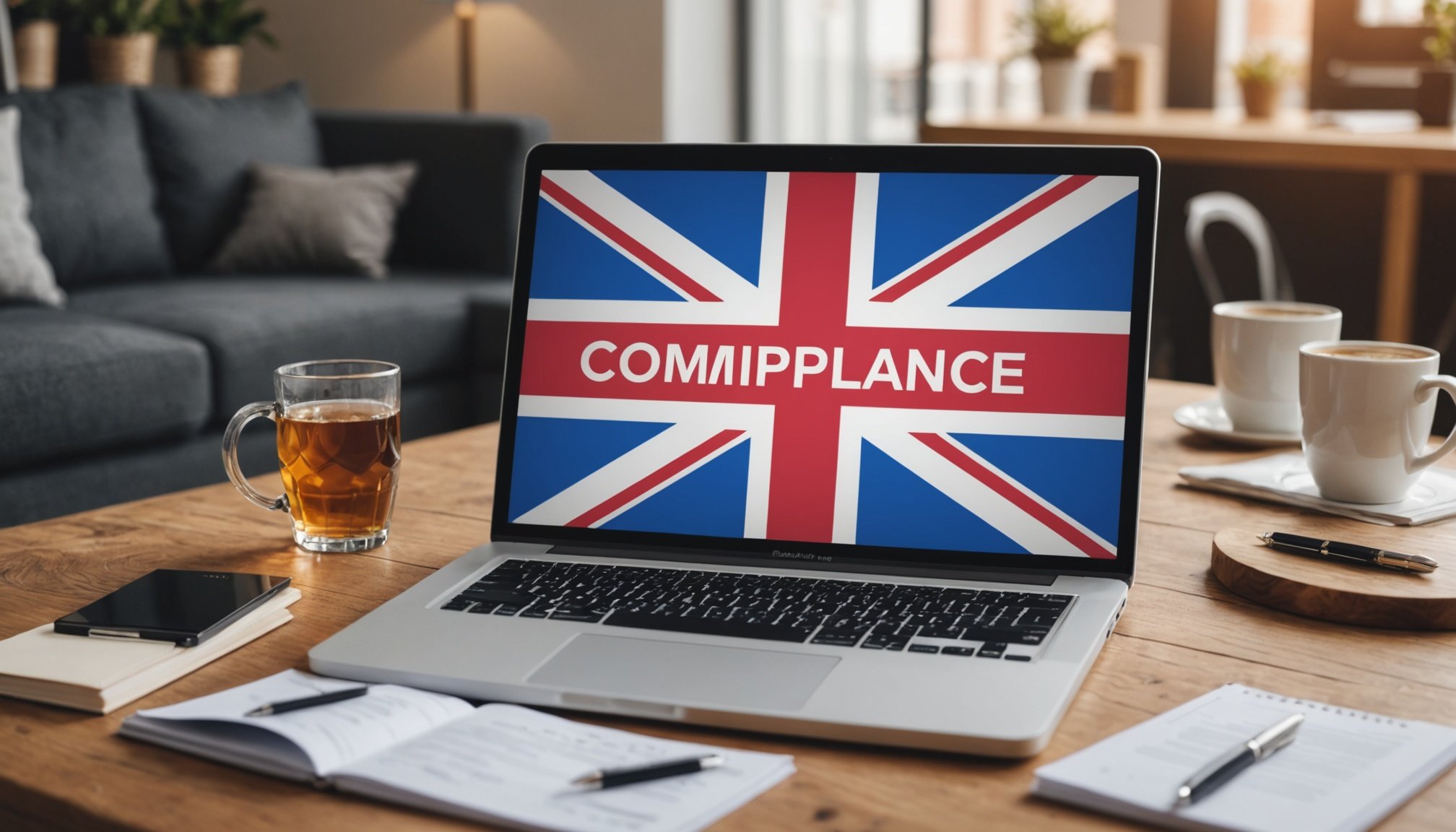The Ultimate Compliance Handbook for UK Businesses on Online Marketplaces
In the ever-evolving landscape of ecommerce, ensuring compliance with various regulations is crucial for the success and integrity of UK businesses operating on online marketplaces. This handbook is designed to guide you through the complex web of laws, regulations, and best practices that you need to navigate.
Understanding Competition Law
Competition law is a cornerstone of fair business practices in the UK, and it plays a significant role in regulating online marketplaces. Here’s how it affects your ecommerce business:
In the same genre : Mastering Legal Compliance: Essential Insights for UK Businesses Implementing Automated Decision-Making Systems
What is Competition Law?
Competition law is designed to promote healthy competition among businesses, ensuring that no single entity can dominate the market unfairly. In the UK, this law prohibits anti-competitive agreements and abuses of dominant market positions[1].
Anti-competitive Agreements
As an ecommerce business, you are prohibited from entering into agreements that prevent, distort, or restrict competition. For example, price-fixing agreements or market-sharing agreements with competitors are strictly illegal. If you are found to be involved in such practices, you could face severe penalties, including fines or even prison sentences[1].
Additional reading : Mastering UK Competition Law: Top Strategies for Legally Sound Exclusive Distribution Agreements
Dominant Market Positions
If your business holds a dominant position in the market, you must not abuse this power. This includes practices such as predatory pricing, exclusive dealing, or refusing to supply competitors. The Competition and Markets Authority (CMA) closely monitors such activities to ensure fair competition[1].
Intellectual Property Protection
Intellectual property (IP) protection is vital in the digital age, especially for businesses operating on online marketplaces.
Trade Mark Law
Securing a trade mark is essential for differentiating your brand from competitors. A registered trade mark grants you exclusive rights to your brand name, logo, and slogans, allowing you to take legal action against unauthorized use. This is particularly critical in the digital environment where content can be easily replicated, leading to potential brand dilution and consumer confusion[4].
NFTs and Virtual Goods
With the rise of NFTs (Non-fungible Tokens) and virtual goods, the landscape of IP protection has become more complex. The UK Intellectual Property Office (UKIPO) provides guidance on the classification of NFTs and virtual goods for trademark registration. For instance, physical goods authenticated by NFTs, such as artwork or training shoes, can be registered within relevant trademark classes[4].
Enforcement Challenges
Enforcing IP rights in the digital world can be challenging due to the anonymity of infringers and the decentralized nature of blockchain domains. Engaging a trade mark attorney can help navigate these complexities and ensure robust protection for your brand[4].
Product Safety Regulations
Ensuring product safety is a critical aspect of compliance for businesses on online marketplaces.
EU Regulation 2023/988 on General Product Safety
This regulation imposes several obligations on providers of online marketplaces. Here are some key requirements:
- Designate a Single Point of Contact: You must designate a single point of contact for both relevant Market Surveillance Authorities (MSAs) and consumers to communicate regarding product safety issues[3].
- Internal Processes: You need to have internal processes in place to comply with product safety requirements and register your contact details with the EU Commission[3].
- Product Recall Notifications: If a product recall is necessary, you must notify affected consumers in a timely and appropriate manner and publish recall information on your online platform[3].
Compliance with Safety Regulations
Non-compliance with product safety regulations can lead to severe consequences, including fines and legal action. It is essential to ensure that all products sold on your platform meet the necessary safety standards.
Data Protection and Privacy
Data protection and privacy are paramount in the digital age, and businesses on online marketplaces must adhere to strict regulations.
GDPR and Data Privacy
The General Data Protection Regulation (GDPR) sets out clear guidelines for the processing of personal data. You must ensure that your business complies with GDPR principles, including transparency, consent, and the right to erasure. Implementing robust data protection policies and security measures is crucial to avoid non-compliance and potential fines[5].
Privacy Policy
Having a clear and comprehensive privacy policy is essential. This policy should outline how you collect, process, and protect personal data. It must be easily accessible to consumers and should be regularly updated to reflect any changes in data processing practices.
Consumer Protection Under the Digital Markets Competition and Consumers Act 2024
The Digital Markets Competition and Consumers Act 2024 (DMCCA) introduces significant changes to consumer protection laws in the UK.
New Enforcement Powers
The CMA will have broader and more discretionary investigatory and enforcement powers under the DMCCA. This includes the ability to impose significant monetary penalties based on global group turnover, up to 10%, without needing to go to court[5].
Subscription Contract Regime
The DMCCA also introduces a new subscription contract regime, which will come into force in spring 2026. Businesses will need to review their terms and conditions and buy-flow wording to ensure compliance with this new regime[5].
Tax Compliance
Tax compliance is another critical area for businesses on online marketplaces.
VAT and Sales Tax
You must ensure that your business complies with VAT and sales tax regulations. This includes registering for VAT if your annual turnover exceeds the threshold, charging the correct amount of VAT on sales, and submitting regular VAT returns[5].
Tax Implications of Cross-Border Sales
If you sell products across borders, you need to understand the tax implications in each jurisdiction. This includes complying with local VAT rules and ensuring that you are not missing out on tax revenues or incurring unnecessary tax liabilities.
Best Practices for Compliance
Ensuring compliance is an ongoing process that requires continuous monitoring and adaptation. Here are some best practices to help you stay compliant:
Use Compliance Software
Utilizing compliance software can help streamline your compliance processes. These tools can monitor regulatory changes, track compliance metrics, and alert you to potential non-compliance issues.
Regular Audits and Reviews
Regular audits and reviews of your compliance processes are essential. This helps identify any gaps or areas of non-compliance and allows you to take corrective action before it becomes a major issue.
Training and Education
Ensuring that your staff is well-trained and educated on compliance requirements is crucial. This includes regular training sessions and updates on new regulations and best practices.
Practical Insights and Actionable Advice
Here are some practical insights and actionable advice to help you navigate the complex landscape of compliance:
Engage Legal Experts
Engaging legal experts, such as trade mark attorneys or ecommerce lawyers, can provide valuable guidance on compliance issues. They can help you navigate the complexities of competition law, IP protection, and consumer protection regulations[1][4].
Stay Updated on Regulatory Changes
Staying updated on regulatory changes is essential. Follow reputable sources and regulatory bodies to ensure you are aware of any new or amended regulations that may affect your business.
Implement Robust Security Measures
Implementing robust security measures is critical for protecting personal data and ensuring compliance with data protection regulations. This includes encrypting data, using secure protocols for data transfer, and regularly updating your security systems.
Compliance is not just a legal requirement; it is a cornerstone of building trust and integrity in your business. By understanding and adhering to competition law, intellectual property protection, product safety regulations, data protection laws, and consumer protection regulations, you can ensure that your ecommerce business operates smoothly and ethically.
Here is a summary of the key compliance areas in a table format:
| Compliance Area | Key Requirements |
|---|---|
| Competition Law | Prohibit anti-competitive agreements, avoid abusing dominant market positions[1] |
| Intellectual Property | Secure trade marks, protect NFTs and virtual goods, enforce IP rights[4] |
| Product Safety | Designate single points of contact, implement internal processes, notify consumers of recalls[3] |
| Data Protection | Comply with GDPR, implement robust security measures, maintain a clear privacy policy[5] |
| Consumer Protection | Adhere to DMCCA, review terms and conditions, comply with subscription contract regime[5] |
| Tax Compliance | Register for VAT, charge correct VAT, comply with cross-border tax regulations[5] |
By following these guidelines and best practices, you can ensure that your ecommerce business on online marketplaces remains compliant and thrives in a competitive and regulated environment.
Additional Resources
For further guidance and support, here are some additional resources you can utilize:
- LegalVision: Offers experienced ecommerce lawyers who can assist with compliance issues and provide unlimited access to legal advice as part of their membership[1].
- UK Intellectual Property Office (UKIPO): Provides guidance on IP protection, including trade marks and NFTs[4].
- Competition and Markets Authority (CMA): Offers resources and guidance on competition law and consumer protection regulations[5].
By leveraging these resources and staying informed, you can navigate the complex world of compliance with confidence and ensure the long-term success of your ecommerce business.











